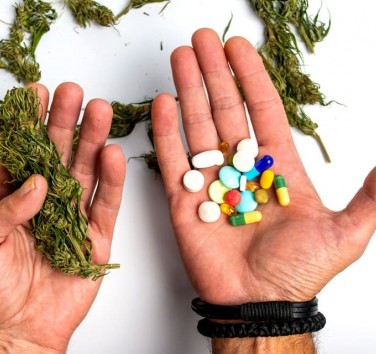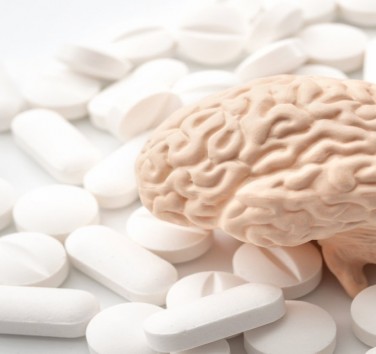CBD is a very effective product to combat the disturbing symptoms of seasonal affective disorder (SAD) such as anxiety, irritability, appetite or sleep disorders. It also has a little-studied but proven impact on the serotonin production system, which improves the overall mood quality of an individual
Let's look in detail at how CBD can help with seasonal affective disorder. But first, let's review our definitions.
What is seasonal affective disorder?
Definition of Seasonal Affective Disorder
As stated earlier, Seasonal Affective Disorder is a type of depression related to the seasons. It is different from "classic" depression, stemming from different causes and is not treated in the same way.
The causes of SAD are said to be the result of a lack of light during the fall and winter months. Indeed, the days being shorter and greyer during this period, individuals are less exposed to sunlight, they have a deficiency in vitamin D. They experience a disruption of their internal biological clock and are affected in their mental health, particularly in their production of serotonin and dopamine.
.jpeg)
Symptoms of Seasonal Affective Disorder
The symptoms of seasonal affective disorder are quite similar to the symptoms of "normal" depression. Here is a comprehensive list of the symptoms of seasonal affective disorder:
-
Depression, irritability or unusual moodiness
-
Lack of interest in activities normally enjoyed
-
Prolonged loss of energy
-
Recurrent sleep problems
-
Heightened sensitivity
-
Isolation and escape from social situations
-
Unusual inertia or restlessness
-
Changes in weight or appetite (including unusual weight gain)
-
Problems concentrating
-
Unexplained feelings of hopelessness or guilt
-
Suicidal thoughts (in severe cases)
Symptoms usually begin with mild intensity and become more pronounced and uncomfortable as the season progresses. They may persist throughout the winter until the warm weather arrives.
In France, more than 500,000 people may suffer from seasonal affective disorder each year, most often women. As each case is different, the intensity of the symptoms can vary depending on the person in whom the disorder occurs.
Treatments for seasonal affective disorder
There are few treatments for seasonal affective disorder. The one that is most promoted is light therapy
Light therapy is the use of a lamp equipped with a UV filter (ultraviolet light) that allows exposure to an artificial white light intense enough to replicate the effects of the sun. In Europe, it is recommended to do a short treatment of 2 weeks, with 30 minutes of daily exposure. The light intensity must be higher than 2,000 lux (lux: unit of measurement of light intensity) in order to act effectively. The clinical standard is estimated at 10,000 lux to have an effective effect on seasonal affective disorder.
Light therapy for the treatment of seasonal affective disorder is often treated with complementary therapy and antidepressant medication.
It is often recommended to combine these treatments for best results. On the other hand, if you prefer a more natural and alternative approach to treating your symptoms, you may want to consider using CBD oil as a supplement to your doctor's advice. But then what effect does CBD have on the symptoms of seasonal affective disorder?
.jpeg)
CBD to combat seasonal affective disorder
What is Cannabidiol (CBD)?
Cannabidiol or CBD, is one of the cannabinoids identified in cannabis. Once consumed, it acts on the body's receptors just like another better known cannabinoid, Tetrahydrocannabinol or THC. Unlike THC, CBD produces a relaxing effect but has no psychoactive effects.
CBD offers many medicinal virtues that are not negligible. It is considered to have anticonvulsant, antipsychotic, anti-inflammatory, antioxidant and antidepressant effects. It is known to have very encouraging effects on certain severe forms of epilepsy and diseases such as multiple sclerosis, Parkinson's (read CBD and Parkinson's disease or fibromyalgia (read CBD and Fibromyalgia).
In France, CBD is legal and marketed on online shops such as 321 CBD, a French shop approved by the state. Indeed, containing less than 0.2% THC (legal limit of THC in cannabis products in France), it has no psychotic effect and offers a beneficial experience to its users.
What are the effects of Cannabidiol on seasonal affective disorder?
As you know, two neurotransmitters in your brain, dopamine and serotonin, play an essential role in regulating your mood and happiness on a daily basis
Active compounds in cannabis, such as CBD, have been shown to actively boost levels of the serotonin and dopamine production systems by interacting with the endocannabinoid system. CBD is therefore very effective in relieving symptoms such as anxiety and depression but also seasonal affective disorder.
Numerous studies conducted by scientists have revealed that patients with anxiety disorder experience significant relief after receiving doses of CBD. Science is very adamant about this, but studies continue to learn even more about the benefits of CBD as a whole.
When it comes to managing depression, many studies have reported that CBD also has antidepressant qualities. In fact, it seems to affect serotonin receptors by increasing their levels, just like antidepressants do
If you are on an antidepressant, you are urged to consult your doctor before consuming CBD, in order to get the right medical advice for your situation.
How to use Cannabidiol (CBD)?
CBD is available in many forms to suit the preferences and lifestyle of each consumer. CBD-rich cannabis flowers can be used by those who prefer to smoke and vaporize the product to provide large amounts of CBD
CBD oils are the most popular products across all lines. They are administered sublingually, and can be added to many foods and drinks or even on the skin directly
The capsules are also an easy option to incorporate into an existing diet.
To stock up on quality CBD products, check out the different CBD ranges at the 321 CBD store.












